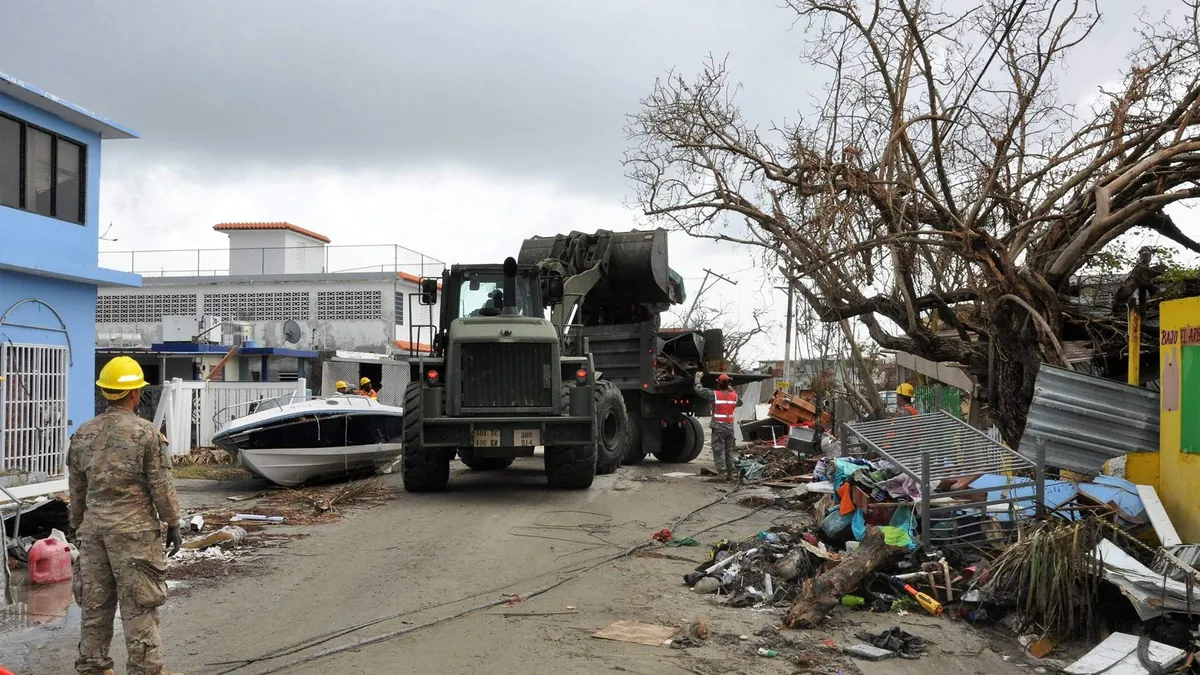Dive Brief:
- As extreme weather events increase in severity, the need for resilient infrastructure is now "universally understood" by government and city leaders. But it needs to be adequately funded, American Society of Civil Engineers (ASCE) Executive Director Tom Smith told Smart Cities Dive.
- While resiliency has been top-of-mind for city leaders for some time, Smith noted a subtle shift in national leadership. Recent appropriations bills coming out of the House and Senate have both made explicit mentions of the need for resilient infrastructure that can withstand the effects of climate change.
- Smith acknowledged that it will still take time to see permanent change, but the onset of frequent natural disasters appears to have focused people's minds. "I think it's going to force a change," he said. "This is ludicrous what we're doing: Waiting for infrastructure to fail and then going in and replacing it and trying to replace it at the same level doesn't make sense."
Dive Insight:
Smith spoke after an event on Capitol Hill in Washington, DC assessing Puerto Rico's ongoing recovery from Hurricane Maria in 2017, which decimated the island and its cities and left elected officials at all levels scrambling to respond. That hurricane is part of a broader pattern of extreme storms and weather to affect North America, including an earthquake that struck off Puerto Rico's coast Monday and a tropical storm that is promised for the island later this week.
But Puerto Rico officials have said that their recovery has been stunted by a federal government slow to respond with financial help for the rebuilding. Ponce Mayor Maria Meléndez previously told Smart Cities Dive that her city-level colleagues are "angry" at the state of affairs, with the island receiving less than $14 billion of the $42.5 billion in aid appropriated by Congress.
It is a "continuous fight" to secure funding, Puerto Rico's Resident Commissioner Jenniffer González-Colón said in a speech at the Capitol Hill event. But she noted a recent win in the House Transportation and Infrastructure Committee, which passed an amendment last week to the Stafford Act to streamline Puerto Rico's recovery and maximize assistance from the Federal Emergency Management Agency (FEMA).
There are also signs that cities are seeking more resilient ways to rebuild following hurricanes. After Hurricane Harvey in 2017, Houston has looked to technology to help mitigate flooding and provide early warnings, among other efforts.
It is a similar story in Grand Bahama in The Bahamas, which has rebuilt overhead power lines to stronger specifications and managed to maintain its power during Hurricane Dorian. The poles holding up those lines were rebuilt and strengthened to withstand higher winds and seemed to do the trick.
"If you design it, engineer it right, you're going to have a much more resilient system," Otto Lynch, president and CEO of consulting firm Power Line Systems, said during the event.
At the city level, resiliency has been a watchword for several years, thanks in large part to leadership from organizations like 100 Resilient Cities, which encouraged cities to form resiliency plans before disbanding earlier this year.
That mantle has been taken up by the Adrienne Arsht-Rockefeller Foundation Resilience Center at the Atlantic Council, which launched as 100RC's successor and seeks to enhance the resilience of 1 billion people worldwide by 2030.
Meanwhile, mayors have called for the federal government to do more to promote resiliency, including the establishment of a dedicated national office or department. "When it comes to liberal, conservative, left, right, it doesn't matter," Smith said. "When you talk about resiliency, I think there's been a good recognition about how critical that is and investing in that."
As the effects of climate change are keenly felt in communities across the country amid dire warnings about the future of the planet, acceptance of the need to strengthen infrastructure against its worst impacts has grown almost universally.
"We saw in the Midwest a huge interest in resiliency because they've seen the impacts of flooding, so I think that's a testament to the appetite for some of these things that might not have been palatable before," Emily Feenstra, ASCE's managing director for government relations and infrastructure initiatives, told Smart Cities Dive.












